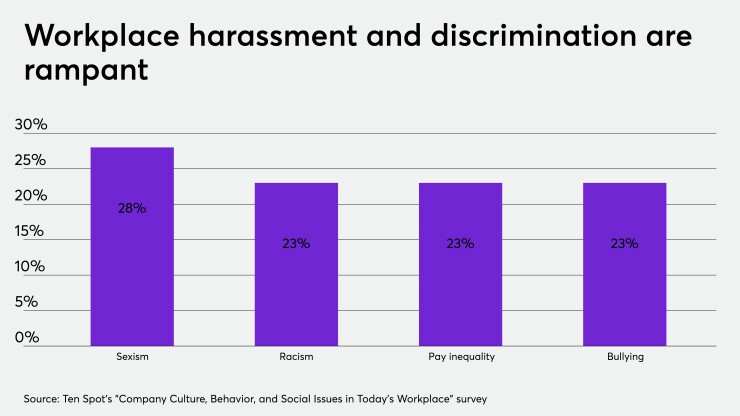Virtual
A shocking 86% of Gen Z workers say they have
Gen Z also feel like they’re on their own in dealing with these issues: 22% said their HR department has done a “poor or horrible” job in dealing with discrimnation and bad workplace behavior, according to the survey.
“As workplaces went online, management didn’t have a good way of making sure that people were nice to each other,” says May Habib, CEO of Writer, a text software platform. “In a physical workplace, you overhear things and may have to take someone aside and say, ‘That’s not our tone here.’ That’s much harder when everyone is online.”
Read more:
Overall, workplace bullying has seen an uptick, as people deal with higher rates of mental health issues and other stressors that are causing them to behave badly. Since the start of the pandemic, 44% of employees have received disciplinary action due to their behavior while working remotely,
HR managers need to tackle this issue before it gets out of control — employees are at risk of suffering from poor mental health and productivity, and are more likely to switch jobs. One in five workers has left their job because of a toxic workplace, according to the Society of Human Resource Management.
“Workplace toxicity is going to affect the individual, the group and the organization,” says Amy Quarton, an organizational leadership expert. “It's going to affect [an employee’s] psychological well-being and their attitudes about their job and manager.”
Read more:
To combat harassment and discrimination, employees want better training that addresses social issues like diversity and inclusion, women and LGBTQ rights and mental health awareness. The Ten Spot survey found that 56% of all employees would feel more engaged and productive at work if their employer addressed these things.
“Company culture no longer just means employees view a company as a ‘great place to work,’” Sammy Courtright, cofounder of Ten Spot, said in a release. “Over the past several years we’ve seen workplace culture evolve from perks and competitive salaries, to how companies treat their employees and make decisions on today’s significant social issues.”
To combat workplace harassment and close the generational divide, HR managers can rely
“It's [not] the employer's job to provide happiness, but it's in their best interest to provide an environment where we can all do our best work,” says Scott Shute, head of LinkedIn's mindfulness and compassion programs. “The most successful companies are actively trying to create a great environment for their employees and that flows through every HR policy.”






